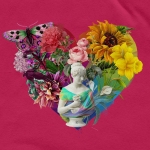 Thursday was the downpour, Friday was the recovery and Saturday is the sun-lashed finale. The fields of Ballymully Cottage Farm embrace the heat as the welly boots are retired to the campsite. The Stendhal Festival organisers are visibly relaxed and the extra footfall (over 10,000 people attending) is proof that this has been a restorative win – a great weekend in spite of funding cutbacks, messy weather and a populace that has been mugged by grim economics. Now they all want to party and Stendhal is willing to oblige.
Thursday was the downpour, Friday was the recovery and Saturday is the sun-lashed finale. The fields of Ballymully Cottage Farm embrace the heat as the welly boots are retired to the campsite. The Stendhal Festival organisers are visibly relaxed and the extra footfall (over 10,000 people attending) is proof that this has been a restorative win – a great weekend in spite of funding cutbacks, messy weather and a populace that has been mugged by grim economics. Now they all want to party and Stendhal is willing to oblige.
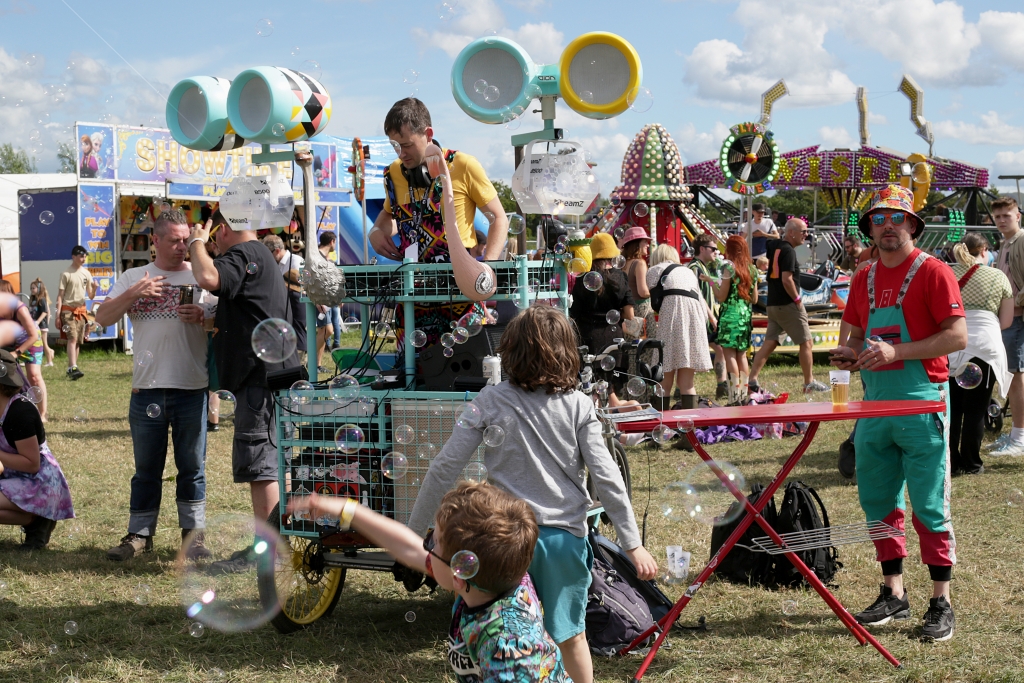
Stendhal Festival 08.07.23. Photo by Stuart Bailie
So here’s Joshua Burnside, realising that during his time on the Karma Valley Stage he has been cooked by UV rays. He makes a public appeal and soon enough, a plastic bottle of sunscreen is thrown towards him. The singer slathers his face and lobs back the Factor 50. The young fan executes a perfect catch and we all cheer.
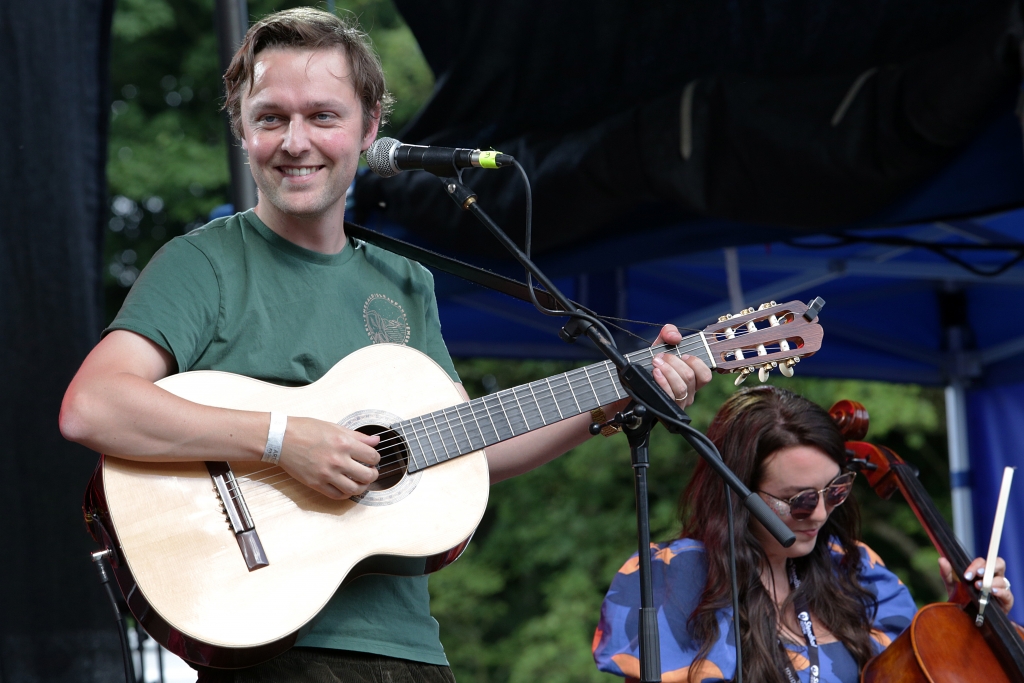
Joshua Burnside. Stendhal Festival 08.07.23. Photo by Stuart Bailie
Joshua has played on most of the stages here, but he fits so well with this grassy amphitheatre and the afternoon joy. He commands the mood, from the edge of ‘26th Street’ to the dreamtime of ‘Under the Concrete’ and the phantom confession of ‘Late Afternoon in the Meadow’. He’s joined by Myles McCormack on banjo and it’s good reason to play fiddle on ‘Where White Lilies Bloom’. This rendition may be a little rough at the seams but still Joshua engages the heart and ‘Noa Mercier’ has a love that will never desist.
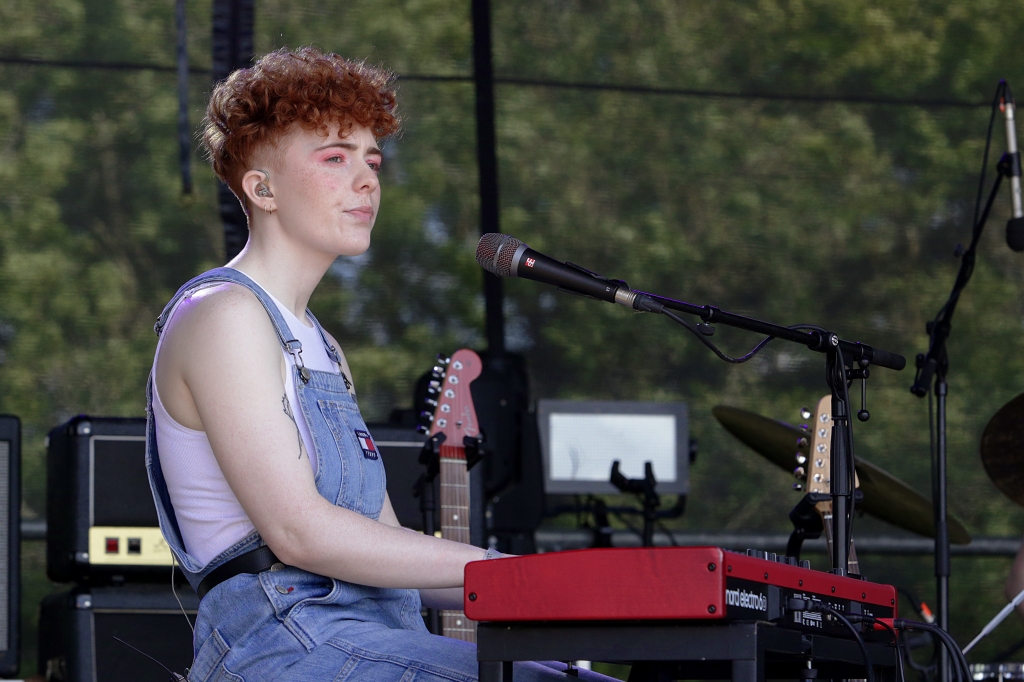
ROE. Stendhal Festival 08.07.23. Photo by Stuart Bailie
Earlier, we saw ROE, another Stendhal mainstay, on the Stevie Martin Stage. Her debut album from last September has made the songs more familiar. There was still an option to go further back, to tunes like ‘Look Who’s on TV’. The mood was assertive while ROE stretched the voice and the art with ‘In the End’ – a challenging song with hints of Phoebe Bridgers. “Everything is different / But I wear the same face” she noted, singing herself into the conundrum.
We headed down to the lower field, noting that the Henry McCullough Stage has been upgraded from a shack to a gleaming trailer install. Quite a lot of the comedy has gone from the festival – the scene has reached superleague proportions and is largely unaffordable for smaller promoters. But still this new platform will work well for the music acts like Tramp, fit to show their ascending value on the approach to midnight.
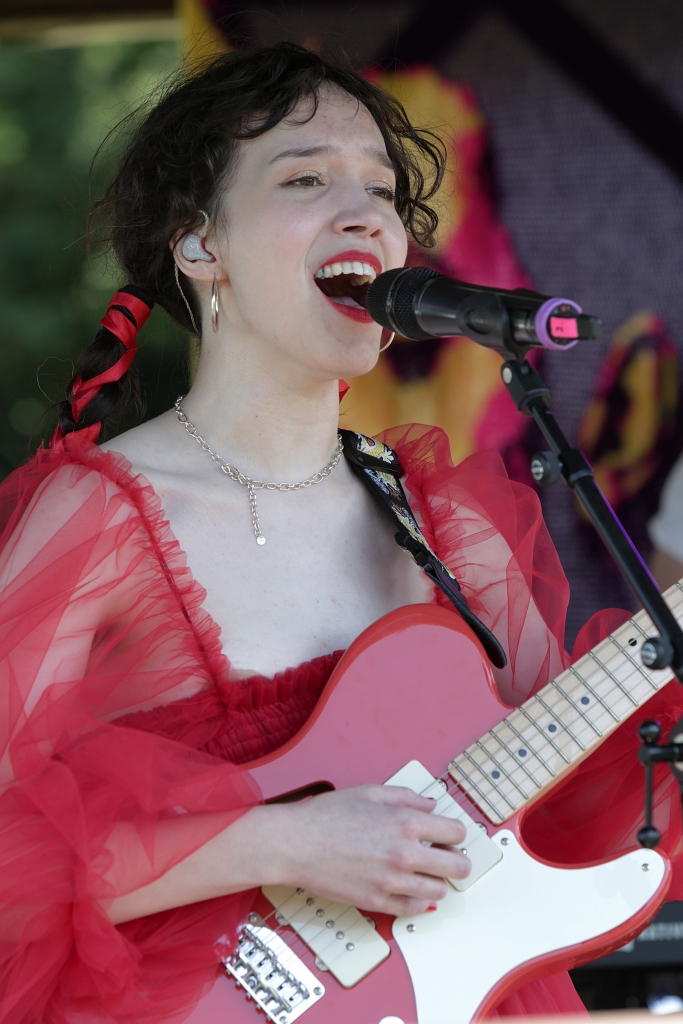
Sasha Samara. Stendhal Festival 08.07.23. Photo by Stuart Bailie
Meantime, the Air Stage has been reconfigured as a bandstand that’s fitted out like a Disney crown. All the better for Sasha Samara, done up in crimson tulle, spinning out the stories and tunes. The persona has become more extravagant and the electronic tracks are supplemented by Si on bass and Matty on drums.
Sasha sings out to her subjects – the sunflowers and the unlovables. This really is her kind of crowd, the astonished kids and the adults who have survived the love wars. On the song ‘Crawl’, she relives a catastrophic affair. She talks of the weight of it (“rocks in my backpack”), and wills everyone to be personally rid of the pesky baggage.
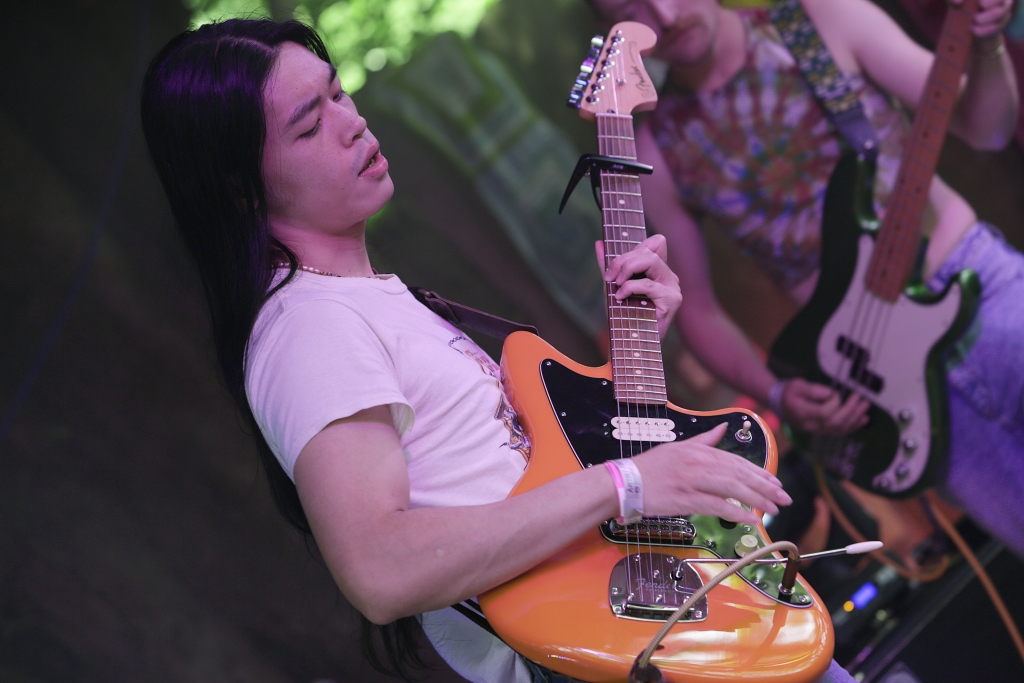
Ethan Hollan. Stendhal Festival 08.07.23. Photo by Stuart Bailie
Ethan Hollan is a relative newbie to the festival, but you can sense the ambition and the core of a fanbase already. He’s at the Wooly Woodland space, which accents the feeling of discovery. He’s shaded by the trees and striking out chords on a Fender Jazzmaster – a guitar once favoured by J Mascis, Thurston Moore and Tom Verlaine. Ethan’s recorded music has a gleaming ache – ‘Love Bite’ was pointedly released on Valentine’s Day. But live, it has more twang and added slacker cool.
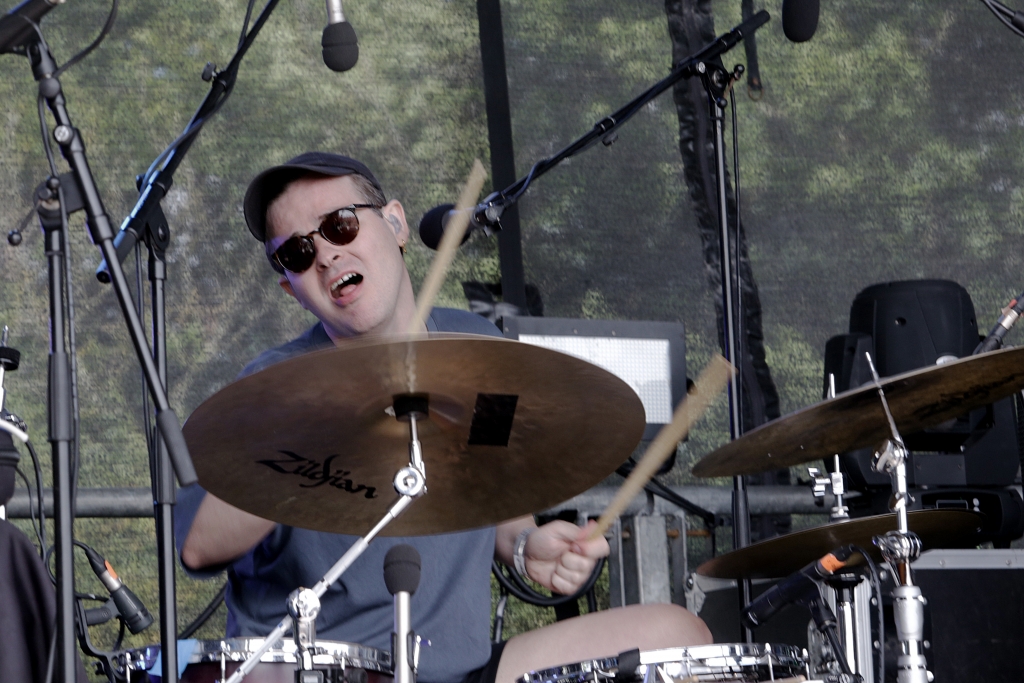
Robocobra Quartet. Stendhal Festival 08.07.23. Photo by Stuart Bailie
Chris Ryan from Robocobra Quartet is a tremendous grouch. He makes a snarky comment about All Folk’d Up and their populist, banjo-ready schtick at Karma Valley. He apologises that there may be ‘mild blasphemy’ in the set, but the guy really doesn’t seem regretful. He will not cut the Robocobra jib to suit the occasion. And so they unroll the uneasy jazz-noir and care less if you’re not inclined.
Which makes for a brilliant, abrasive mood. ‘Chromo Sud’ regards the infernal planning of a dead housing estate. No-one sings along in the chorus. Because there’s basically isn’t one. The musicians are having their best life. We enter the labyrinth, like they ask us to. And we smile broadly at the panic attack of ‘Wellness’. We hear absurd commands, taken from online influencers, and then Chris is barking, apoplectic. “So blessed!” he squawks.
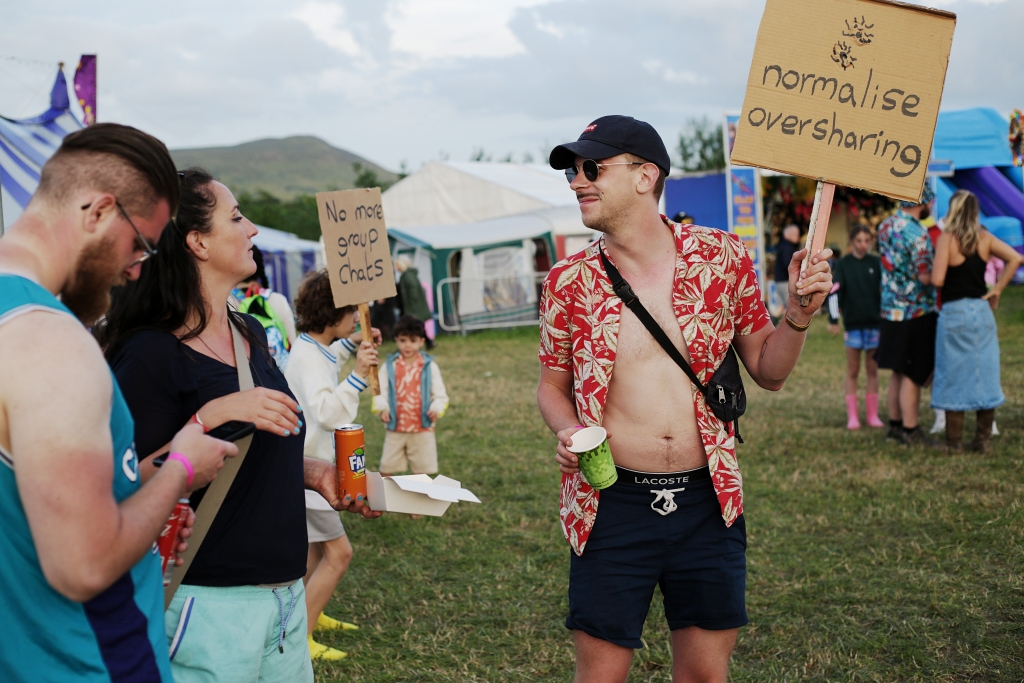
Stendhal Festival 08.07.23. Photo by Stuart Bailie
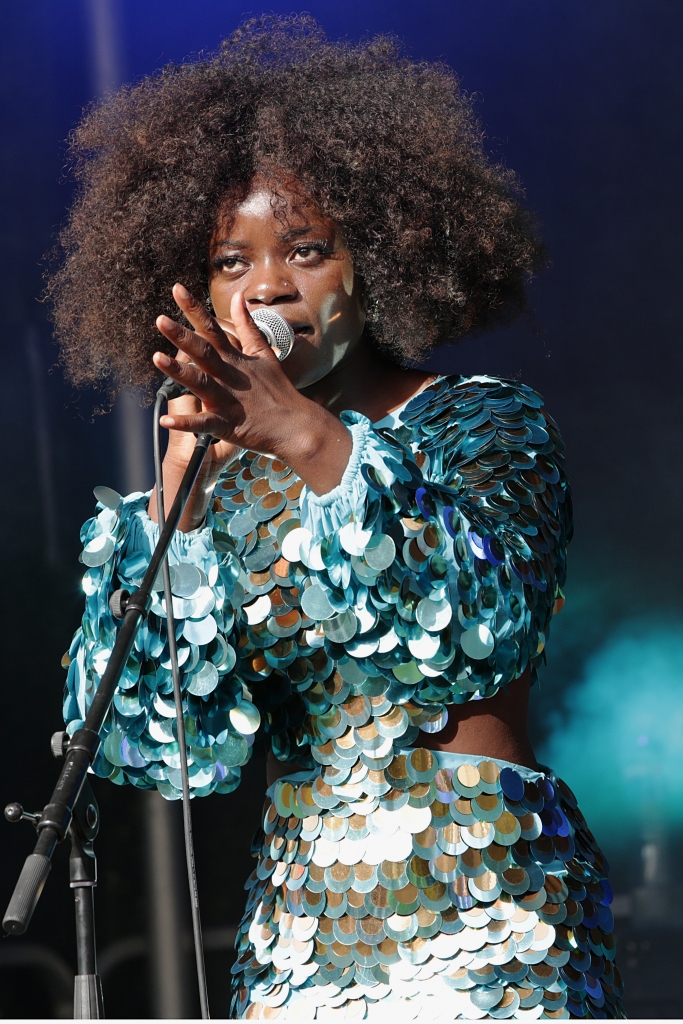
Winnie Ama. Stendhal Festival 08.07.23. Photo by Stuart Bailie
Winnie Ama is rocking the glitterball party dress and channelling Diana Ross. The songs have motivational worth and most of them come with a free preamble. There are relationships that need writing off and sentiments that are unvoiced. But Winnie puts it out and asks for empathy. Also ‘Don’t Worry Baby’ is the best invitation to live in the moment and the Shirelles/Carole King classic, ‘Will You Still Love Me Tomorrow’ is well enacted.
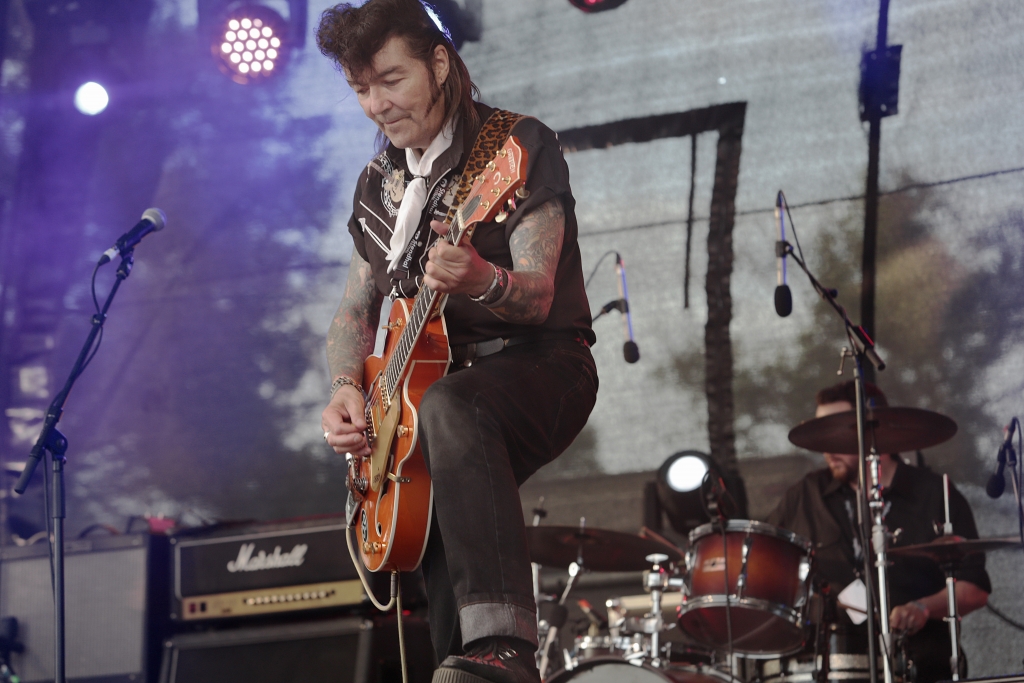
The Sabrejets. Stendhal Festival 08.07.23. Photo by Stuart Bailie
The Sabrejets play rockabilly for their own pleasure, finding simpatico friends in Europe and even America. It’s a bit of a niche thing, and they have minor expectations for this gig. Happily, they are confounded. Several hundred people are dancing. ‘Wild One’ is dedicated to Iggy. Guitarists Brian Young and Liam Killen are throwing the shapes and getting encouraged. Original tunes are keenly met. They sign off with ‘I Fought the Law’, wise to versions by The Clash, Bobby Fuller and The Crickets. It will not fade away.
This is the 13th edition of Stendhal and it’s a first time for Cara Dillon. She’s a Dungiven girl, but her major folk career has caused her to miss this local connection, until now. So there’s a need to catch up, to regale the extended family and the connoisseurs of traditional music that’s magical and out of time.
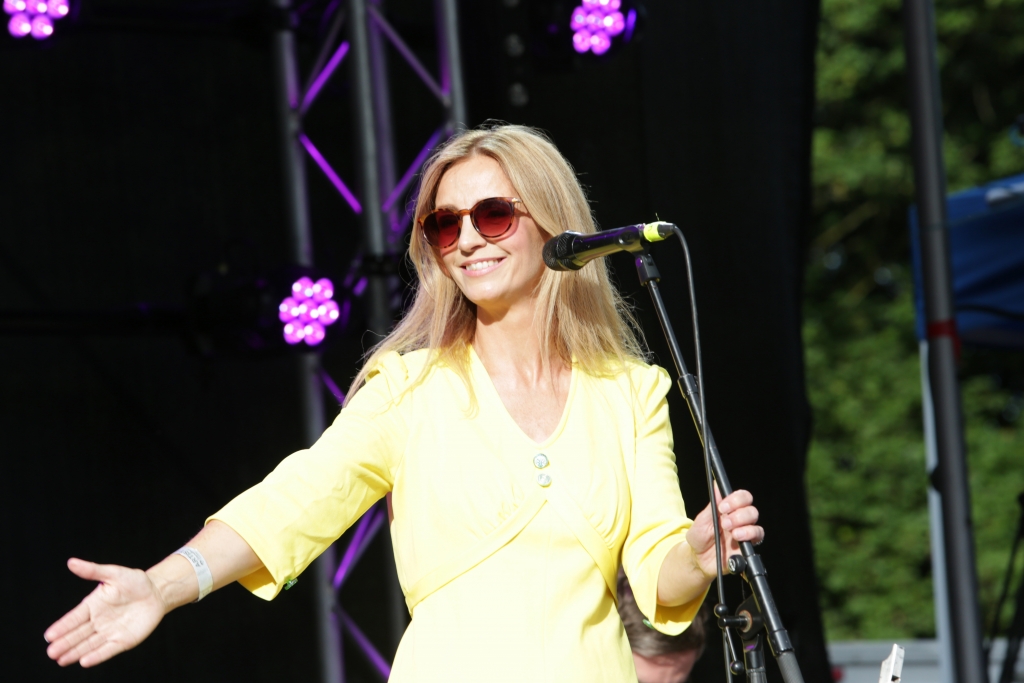
Cara Dillon. Stendhal Festival 08.07.23. Photo by Stuart Bailie
She’s wearing borrowed sunglasses and unpacking the ancient story songs like ‘Blackwaterside’. Her style is unstated but absolutely compelling. ‘Black is the Colour’ is a signpost to the final edition of the Derry Girls series and Cara is clearly pleased to be part of that experience. She updates us on her upcoming record, based on lockdown poems and set to music by her husband Sam Lakeman. ‘Coming Home’ has a spoken word part and a great discharge of sentiment. Presently, she takes us to ‘The Hill of Thieves’, a trail that crosses over Glenshane into Dungiven history. It was meant to be performed here.
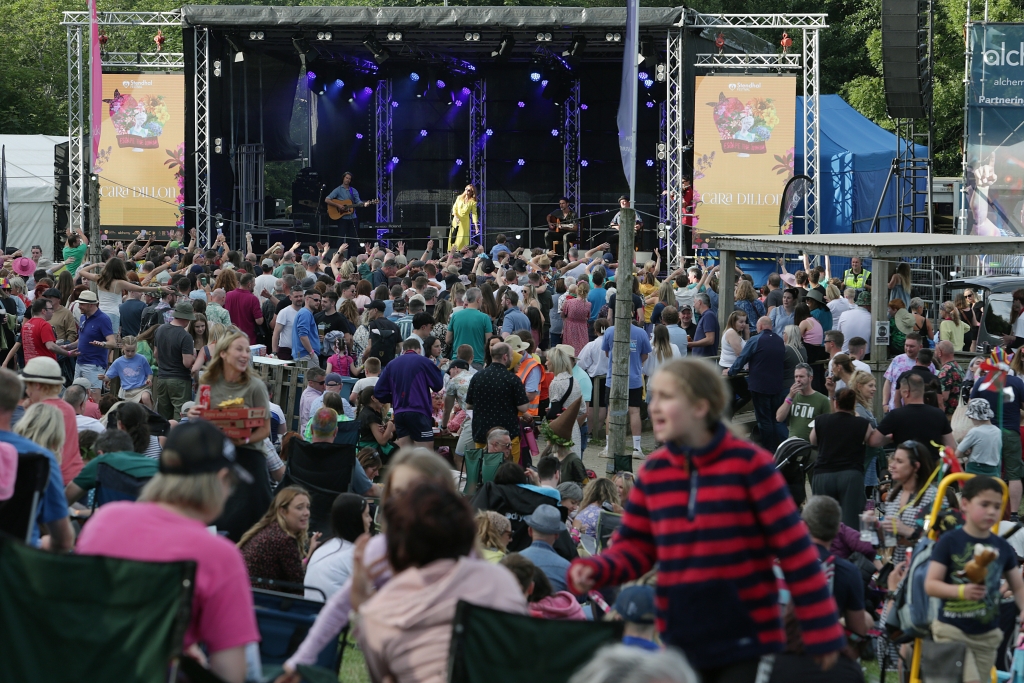
Stendhal Festival 08.07.23. Photo by Stuart Bailie
Elsewhere, the good people of Stendhal are planning for the cranked-up folk of The Scratch, the return of Bell X1 and Tramp fever in the far corner of the site. But something great and indelible happens when Cara Dillon does the Tommy Sands song, ‘There Were Roses’. It’s like Once Upon a Time in Northern Ireland compressed into a few moments. A sectarian killing, a reprisal murder and the perpetration of conflict. Two friends gone and a townland in pieces. She asks us to sing the chorus. It breaks your heart. Bless Cara and bless Stendhal.
Stuart Bailie







 Twitter
Twitter